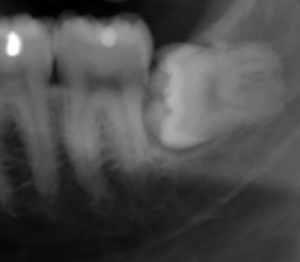If you’re reading this article your dentist has probably recommended your child eventually have his or her wisdom teeth removed. Like most parents we are quickly full of questions: “At what age should we have this done, do really have to, and how much pain will they be in?”.
Wisdom teeth (also known as “Third Molars”) are four permanent teeth located on the top, bottom and back corners of your mouth. They begin forming around a child’s 10th birthday and for most people come in between 15 and 25 years of age; (a time that has been called the Age of Wisdom because people graduate high school and college during these years and are said to become wiser.) The American Dental Association recommends that people between 16 and 19 consistently have their wisdom teeth evaluated to see if they need to be removed.
There isn’t a perfect age to have your child’s wisdom teeth removed. So, if wisdom teeth are in, should you have them out now or wait? Unfortunately this is isn’t a simple answer as there are a few factors to consider.
If their wisdom teeth are impacted or crowding their existing teeth they should be removed. Impacted wisdom teeth can grow crooked due to the lack room in your mouth and push against the other teeth. This can cause pain and often leads to bigger problems such as infection as bacteria can easily grow between the crowded teeth .

This is why we tend to remove wisdom teeth more frequently than not. Other issues (as noted by WebMD) can be:
You should talk to your dentist as soon as possible about your child’s wisdom teeth as surgery involves removing the gum tissue around the tooth and the connective tissue between the tooth and bone. The tooth is then removed and a suture (or sew) is placed on the opening in the gum line. Your child will be put under anesthesia to help ease the pain. And the operation shouldn’t take more than an hour.
Waiting to see your dentist about impacted teeth can be costly and painful. As your child ages, the bones in his or her mouth will get harder, the wisdom tooth will continue to grow long roots, which will make the teeth harder to remove. Older adults may experience difficulty with surgery and complications after surgery.
After speaking with your dentist, if you decide to keep them we recommend regular exams and xrays to ensure everything remains OK. Even though he or she may not have pain, wisdom teeth are susceptible to infections and pushing other teeth out of alignment over time. Some dentists continue to recommend the removal of healthy molars to prevent problems later on.
Is having your wisdom teeth removed painful?
It can be, but with proper anesthesia, care and treatment you should only feel pressure, slight discomfort, but not a lot pain. If you do feel any sort of pain during the procedure, let your dentist know as he or she will more than likely re-apply your pain numbing agent.
Fully recovering from this procedure can take a week or so, however most people feel better after a few days; especially when following these post procedure instructions:
What should be eaten after surgery?
A liquid diet of liquids and soft foods (yogurt, pudding, smoothies) is recommended the first 24 hours, but do not drink from a straw, since the suction can loosen blood clots. Then it’s a soft foods diet for four to five days: Think mashed potatoes, scrambled eggs and pastas. Avoid anything that requires significant chewing and opt for colder foods that will feel soothing.
If you have questions about removing your child’s wisdom teeth please contact Smilez Pediatric Dental Group at (703) 468-0700.